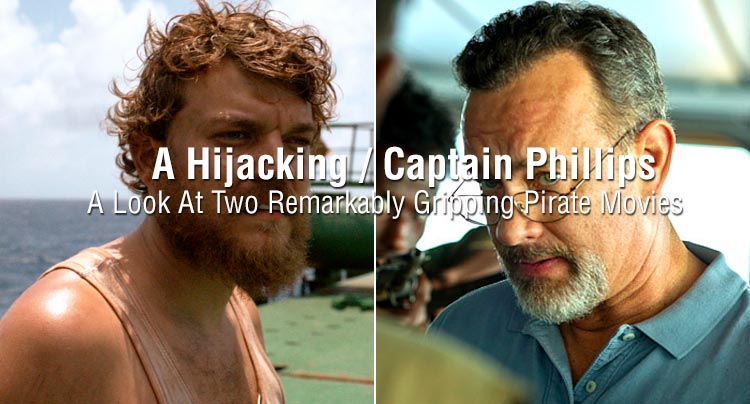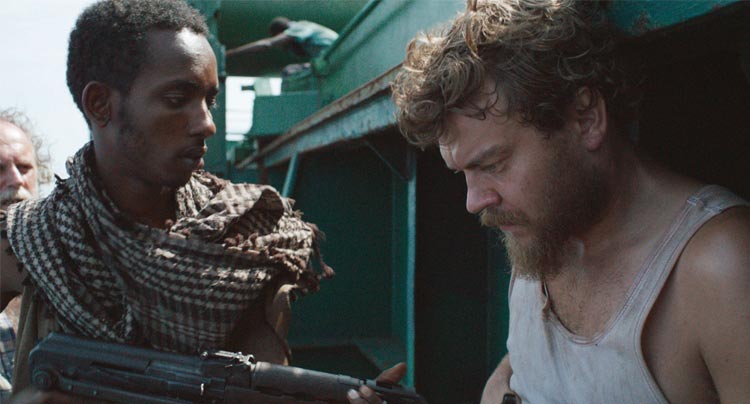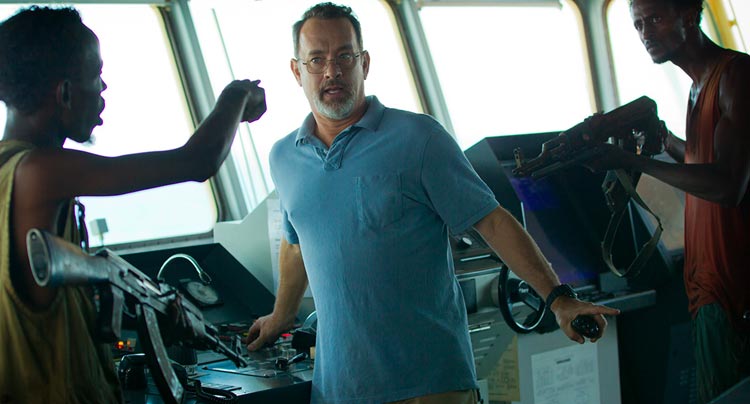A Hijacking / Captain Phillips: A Look At Two Remarkably Gripping Pirate Movies

In light of Paul Greengrass’ Captain Phillips — in which Tom Hanks’ performance is the tip of an iceberg of Oscar winning collaborators involved in a terse, modern-day piracy movie — the far fewer-studded Danish thriller A Hijacking (Kapringen) has likely fallen by the wayside. My respect for Greengrass (despite Green Zone) aside, Captain Phillips draws few similarities to A Hijacking, even given the shared dramatic premise: white man’s (Danish, American) ship is hijacked by Somali pirates demanding obscene sums of money for hostages. Rather, what director Tobias Lindholm has achieved with A Hijacking seems counter to every trope from which more conventional Hollywood-backed thrillers (among which we can count Captain Phillips) are made.
Yet here are two remarkably gripping and effective movies that are unlikely to escape comparisons to one another, in spite of their vastly different formal and performative sensibilities. This is not a think-piece espousing upon a pious white hat-black hat division with regard to correct or incorrect filmmaking styles. I’m hoping instead to look at their differences as contributing factors to similarly white-knuckle viewing experiences: both have in common highly contemporary presentations of the medium, but in many respects the ways in which the stories are told form a kind of unmissable and inherent flag-waving for the aesthetic, moral and emotional values of their makers and subjects.
We can’t rush these people. Time is a Western thing. It means nothing to them.

A Hijacking
The titular act of hijacking in A Hijacking is never shown: the first clue that director Lindholm has other priorities. The importance is not in reliving the ordeal that young father and Cook Mikkel (Pilou Asbaek) and crew endured when their cargo ship was taken upon, but the fact that—cut—here they are, suddenly in a situation nobody expected and fewer are prepared for.
Back home in Copenhagen, CEO Peter Ludvigsen (Søren Malling) is busy caught between expert hostage-scenario negotiators, headed by frankly-speaking Brit Connor Julian (Gary Skjoldmose Porter), and a board of advisors within the company growing increasingly finicky about the political ramifications for their business as the situation grows increasingly — and unapologetically, with Lindholm’s dispassive tally of chronological title-carding through not days, but weeks and months — drawn out.
With a stoic, subdued but no less impressive performance for its restraint, Malling plays a man-in-charge in too far above his head, incapable and unwilling to let anyone see it. Advised by the experts to let the experts do the talking, Peter insists on negotiating with the pirates personally, feeling a responsibility and accountability for his men that is both heroic and, in a moment of both knowing and dread for the audience, foolhardy.
In extraordinary circumstances where human lives — their families and livelihoods — are reduced to seemingly meaningless numbers of dollars, the common gut reaction is to just give them what they want. That the expert negotiators insist on playing the riskiest hardball (a figure of millions demanded by the pirates is retorted by a nominal increase of tens of thousands to a base of mere hundreds of thousands, for example) is not a tactic driven by profits or money-saving, but a strategy of psychological chess-boarding that more emotionally-attached men like Peter struggle with. In numerous instances, Peter must hang up on a member of his crew begging for their life, offering a curt, dismissive “I will not discuss this with you,” when we can feel he is seeking nothing more than his own redemption through their safe release. Scenes showing Peter alone, before and after these calls, highlight the incredible toll they take and elicit genuine sympathy for the corporate bigwig in a suit. Lindholm understands, and makes us understand, that negotiations of this sort benefit little from bombastic threats or rash decisions: that sometimes silence speaks louder than words, even in the most extraordinary cases.
Onboard, the bargaining on behalf of the Somali pirates falls to interpretor Omar, in a chilling and terrific turn by Abdihakin Asgar both sympathetic and, on a whim, frightening. Omar insists, persistently, to Mikkel and crew that though he speaks their language and speaks for them, he is not one of them. In one scene in particular Mikkel crosses this line, a phone call to his wife dramatically turning into perhaps the most psychologically harrowing moment of the picture. It’s a reminder from Lindholm that regardless of the surface-level formality and sense of ordered, polite transactions he so effectively and unflashily portrays, A Hijacking is dealing with complex, subtextual exchanges of power; where every word selection, every second delayed in response, carries with it communicative consequences that impact the final negotiation.
The turn of events that lead to the resolution of conflicts may well be hardwired into the fact that the pirates understand humanity. But the undercutting of this moment, the closest A Hijacking comes to traditional sentimentality, in the coda brilliantly and daringly underscores that this is a film that remains attuned to the immeasurable and finally unpredictable chaos of the modern world.
If they find you, remember—you know this ship, they don’t.

Captain Phillips
For a director known for his ability to bring a frenetic urgency to action filmmaking, yet do so in a way that the viewer remains oriented and aware of the stakes, Captain Phillips must rate as one of Paul Greengrass’ most accomplished achievements. He showed with the cathartically powerful United 93 (2006) and in the more conventionally thrilling The Bourne Ultimatum (2007’s franchise high) a brand of you-are-there cinematography and rapid-fire editing that has become his signature, but equally found him detractors.
Greengrass’ is a cinema of seemingly mundane scenarios repeatedly revisited and cross-cut amidst a melange of other mundane scenarios, acutely aware and across all the tiny little details that are unraveling a greater narrative tension slowly building. It’s not everybody’s cup of tea, but regardless of whether you want to allow it to, it works. No filmmaker is better at depicting a good day gone bad than Greengrass, and Captain Phillips captures a good day gone particularly bad indeed for Richard Phillips (the inimitable Tom Hanks).
Working from a script by Billy Ray from Phillips’ own memoir, the witnessing of the buildup and inevitable hijacking of Maersk Alabama, the US Cargo ship sailing the Somali Coast, is paramount. It’s a partly dramatic and partly political directorial decision to provide such emphasis on the event: two skiffs approaching fast, one with a more motivated band of pirates than the other, dissuaded as the latter are by the perimeter of high-speed water jets brought up to defend the oncoming attack. Where the Europeans were content with a mere smash-cut to the sticky situation, Greengrass is here purposefully trying to provide an elongated context for Phillips’ heroism beyond whatever even he deemed himself capable: that here is a man who has worked his way to the top through a disciplined study of process and protocol, but that despite his best preparations the ship’s resources — and by extension the institutions that provided them — have failed him; that here is an instance where a man should be able to just reach for a fucking gun. But as marine regulations of the time (circa 2009) dictated all Cargo ships were to sail unarmed, Phillips is left to rely on his own resourcefulness and personality to try and reach a resolution in his interactions with Muse (impressive first-timer Barkhad Adbi), his Somali counterpart.
There is a gleeful sense of schadenfreude when Muse and his crew learn they’ve boarded an American ship, as if they’ve struck some kind of moral jackpot in doing so. Muse makes a habit of mocking Phillips’ Irish heritage, even as they grow to understand each other over the standoff; one of many knowingly cynical jabs at the status of the United States as a much-touted land of opportunity. When things invariably escalate to a point where both Phillips and Muse are backed into their corners, a desperation emerges in each that takes remarkably different forms. Muse finds himself in a life or death scenario: literally on a sinking, claustrophobic lifeboat, his hostage his only bargaining chip, his rag-tag band of pirates variously injured or frustratingly inept, losing hope but seeing no way forward but to commit to a fight he can’t win. Across the boat, we see in Phillips’ eyes the startling realisation that Muse is realising exactly this. As the almost cartoonishly Yankee-sounding S.E.A.L ‘negotiator’ cooly disseminates radio instruction with unfailingly exact protocol, syntax and procedure, we feel the weight of a land with seemingly infinite resources flexing its muscle, but doing so only as and when provoked in the appropriate manner. If the Somalis question the American Dream for non-Americans, there is no questioning this—the finality of the end, and the restoration, however momentary, of order to the modern world.
That we have so deeply related to Phillips is testament to the effortless niceness and rounded comprehensibility of Hanks as a presence and a performer. For all his brave and Big (pun intended) performances in the past, his Phillips resonates because he seems, this time, to be trying so very little; and similarly for all the prevailing America, Fuck Yeah! that can be felt in the inevitable third act, Greengrass too manages to make something subversive by dialing back the largess of the patriotic sentiment. Are our emphatic responses to the clinical efficiency of the Marines not motivated by the same impulses that caused a cackle when the Somalis realised they’d jumped an American ship? In Captain Phillips‘ understated, but unexpectedly moving final scene, Hanks unravels with a kind of ‘un’-acting acting that brandishes any semblance of method, technique, or studied process, and which brings the film to a thematic and experiential converging: we are right there, with him, like him, not knowing where we are — or where we stand.
